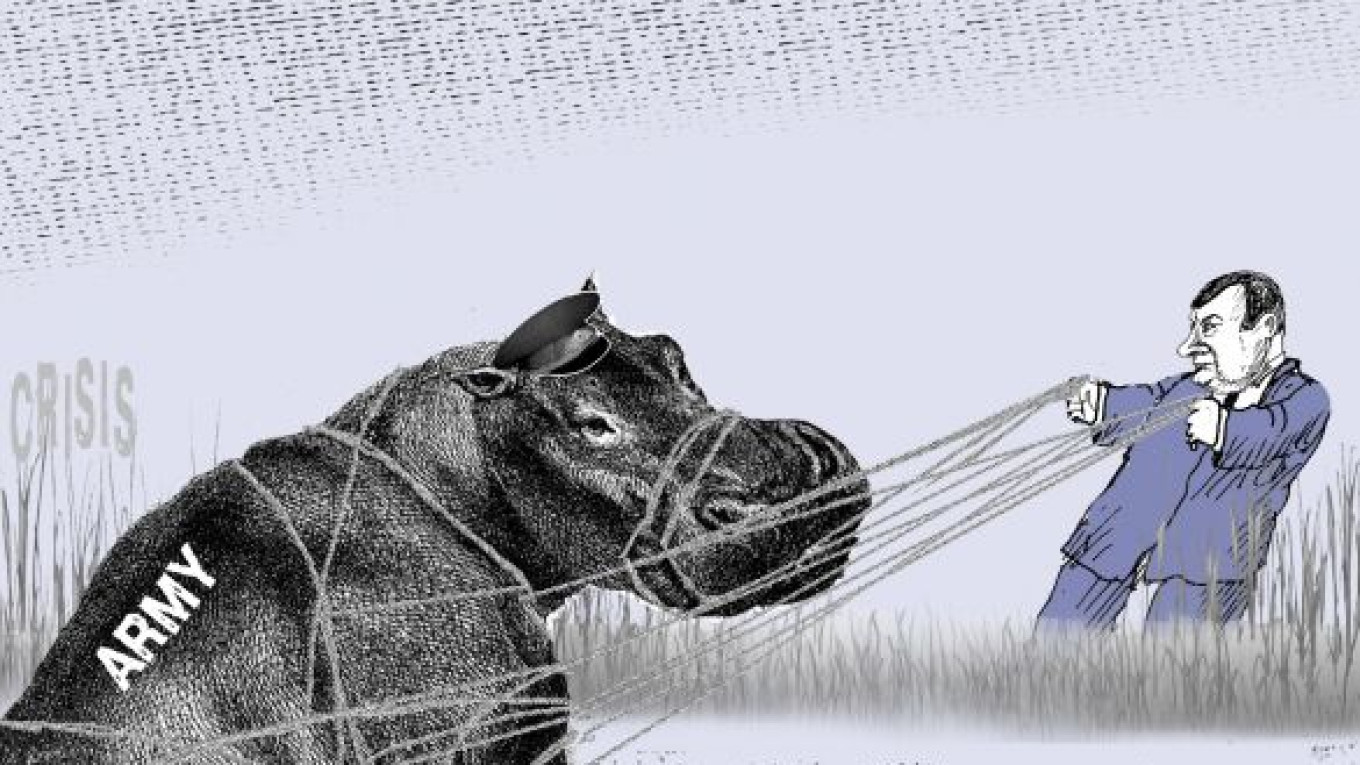The third anniversary of the military reforms that Defense Minister Anatoly Serdyukov first announced to the top brass on Oct. 14, 2008, passed virtually unnoticed. We all remember the relentless criticism aimed at Serdyukov’s reforms throughout 2009 and 2010, but this has all but disappeared. And there is good reason for this.
First, despite backroom maneuvering to undercut the reforms, the military has largely adapted to them. Contrary to what many skeptics predicted, the reforms did not lead to the army’s collapse. Despite their many shortcomings, the reforms clearly gave a new dynamic to the armed forces. In fact, their success was due in large measure to how quickly they were implemented. Defense Ministry officials wisely avoided the temptation to make gradual changes — to “cut the tail off one piece at a time.” They rapidly and completely transformed the main body of the army and forced the military to accept the new reality.
Second, military reforms have vastly improved the situation for military personnel and weapons procurement. Officers’ salaries have increased significantly, and additional raises are expected in 2012. In addition, conditions for conscripts have improved, and military units have begun receiving new, modern military equipment. The initial steps toward creating a professional army has also been largely successful, although there is still a tremendous amount of work that needs to be done.
Third, since Serdyukov enjoys the full support of the political leadership, his critics and opponents have lost any hope of undermining his position as defense minister. And given the huge growth in funding for the armed forces, nobody can accuse political leaders of neglecting the interests of the military. As a result, the anti-Serdyukov camp has been severely weakened.
In the last three years, the military has taken concrete measures to create a smaller, battle-ready force — one that is better equipped and trained to fight limited, local conflicts such as the Russia-Georgia war in 2008 rather than a full-scale engagement against NATO.
Working toward this goal, the overall number of troops have been reduced. The only exception is in the Southern Military District, which was beefed up to better deal with the separatist threats from the North Caucasus. Many units were even dissolved and reductions were made to battle formations in the West and Far East. What’s more, the so-called ghost units that exist on paper only have been eliminated, and the basic formation of ground troops has shifted from divisions to the smaller brigades.
? What’s more, the quality of combat training has improved. The scope of daily training and large-scale annual military exercises has already surpassed Soviet levels. The massive rearmament program for 2011-20 could mean a real breakthrough for the military as it will equip the army with the latest technology to fight modern-day battles and wars. According to this plan, 70 percent of all weapons in the armed forces will be modernized by 2020.
But there is still a significant risk that the reforms could be derailed. The two main risks are money and people.
The urgent need to modernize and re-equip the army has led to an ambitious 20 trillion ruble ($673 billion) armament program for the next decade. The defense budget could increase from 1.5 trillion rubles ($50.5 billion) for 2011 to 6 trillion rubles ($202 billion) by 2020. The main problem is that Russia will be attempting to radically modernize its armed forces during a highly unstable global economic environment. If the global economy enters a new recession, it will necessarily hit Russia’s economy as it did in 2009. In this case, the country’s military programs will most likely be the first to experience cuts.
As for people, one of the main problems with the army’s new look is the Defense Ministry’s inability to make a complete transition to a professional army and eliminate the draft. This is due largely to resistance within the top brass by hard-line conservatives and a shortage of funds. But Serdyukov needs to make the full transition to a professional army a top priority because it is highly professional and trained people who win wars, not equipment.
Creating a fully professional army is major component of the military’s modernization. To achieve this goal, however, political and military leaders need to show the same willpower that they have displayed over the past three years when they successfully carried out other important military reforms.
Ruslan Pukhov is director of the Center for Analysis of Strategies and Technologies and publisher of the journal Moscow Defense Brief.


